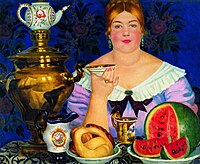- For other meanings see kalach.
 | |
| Type | Sweet bread |
|---|---|
| Place of origin | Ukraine, Russia, Serbia |
| Main ingredients | Wheat flour |
Kalach, kolach, or colac (Ukrainian: кaлач or колач; Russian: кала́ч; Romanian: colac; Serbian: колач/kolač), is a traditional East Slavic bread, commonly served during various ritual meals.[1] The name originates from the Old Slavonic word kolo (коло) meaning "circle", "wheel".
Ukrainian tradition
Ukrainian kolachi (plural) are made by braiding dough made with wheat flour into ring-shaped or oblong forms. They are a symbol of luck, prosperity, and good bounty, and are traditionally prepared for Svyat Vechir (Holy Supper), the Ukrainian Christmas Eve ritual, most often in the form of three round bread loaves stacked one atop the other with a candle in the middle.
In the area around Kiev, it was custom for a midwife to give a kalach as a gift to parents, as part of a fertility blessing.[2] Kalaches were also used in funeral ceremonies.[3] As well in Galicia and Bukovina they were given by children to their godparents in ceremony called a кола́чини (kolachyny) or кола́чання (kolachynnya).[4]
Bread dishes such as kalach are highly prized for their artistic craftsmanship. The Bread Museum in L'viv, Ukraine, contains many examples of intricately woven kalach, paska, and babka.[5]
Russian tradition

The Russian word калач (kalách, kolach) stands for a specific type of twisted white bread. In former times калач meant any kind of white bread, and before modern methods of grinding wheat came into use, white bread was classed as a type of fancy bread.
Cultural legacy
A man who made kalaches was called a калачник (kalachnik), which sometimes by sandhi effect became калашник, and sometimes such a man's descendants thus got the surname Калачник (Kalachnik) or Калашник (Kalashnik), which in Russian became Калашников (Kalashnikov) (= "[son] of the kalach-maker").
Colaci
 Making colaci | |
| Type | Bread |
|---|---|
| Place of origin | Romania |
Colaci is a traditional Romanian braided bread, typically made for special occasions or holidays, such as Christmas, Easter, weddings, and funerals.[6]
It is a traditional custom of Romanian rural society, on Christmas Eve, to gather in groups, to go in different houses and to sing colinde, traditional Christmas carols. In some villages, they go first to the mayor's house, followed by the teacher's house, whereas in other parts there is no pre-established order. The families would then invite them into the house, and give them different small gifts such as nuts, dried fruits, and colaci.
The word came from Bulgarian kolač and ultimately from Proto-Slavic kolo ("circle", "wheel") referring to the circular form.[7] The word may be cognate with challah (Hebrew: חלה ḥallah) and Greek ϰολλιξ.
See also
References
- ^ Nokony, Vkka A. (1989). "The Ukrainian Museum of Canada". Material History Bulletin (Spring).
- ^ Boriak, Olena (2010). "The Midwife in Traditional Ukrainian Culture: Ritual, Folklore". Folklorica.
- ^ Havryl’iuk, Natalia (2003). "The Structure and Function of Funeral Rituals and Customs in Ukraine". Folklorica. VIII (2).
- ^ http://ukrlit.org/slovnyk/%D0%BA%D0%BE%D0%BB%D0%B0%D1%87%D0%B8%D0%BD%D0%B8
- ^ http://www.karpaty.info/en/uk/lv/lw/lviv/museums/hliba/
- ^ "Colac" (in Romanian). DEX online: Dictionar Explicativ al Limbii Romane (Romanian online dictionary).
- ^ Colac (in Romanian). DEX online: Dictionar Explicativ al Limbii Romane (Romanian online dictionary). References: Miklosich, Slaw. Elem., 25; Cihac, II, 67; Conev 66
| Appetizers & salads | |
|---|---|
| Beverages | |
| Breads | |
| Cheeses | |
| Condiments & sauces | |
| Delicatessen |
|
| Desserts |
|
| Dishes |
|
| Grilled meats | |
| Soups |
|